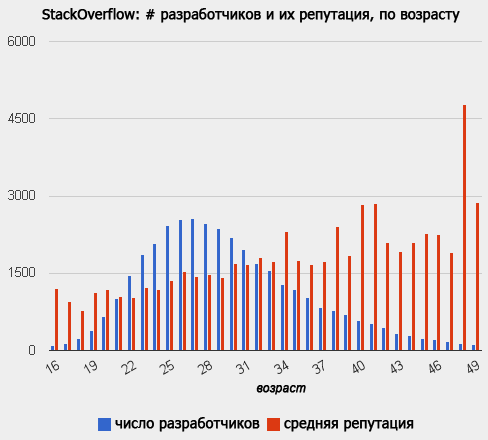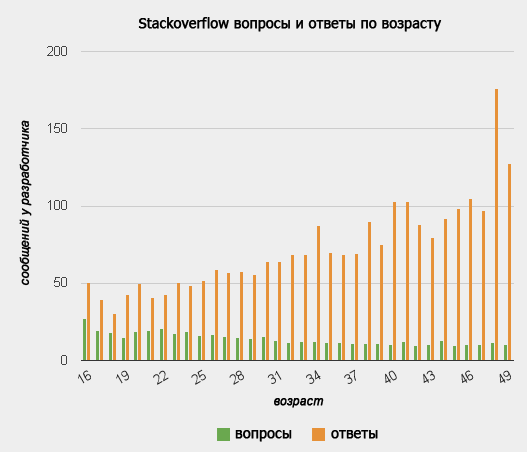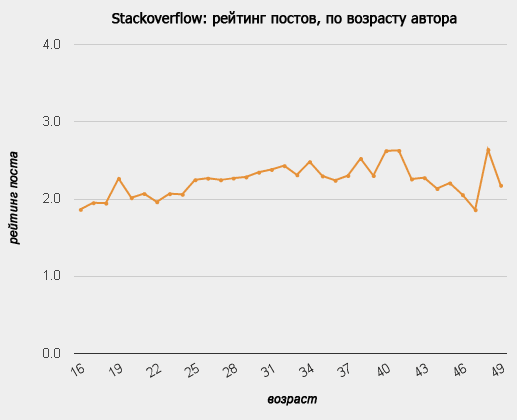With age, developers are getting better, but they are getting smaller.
Younger programmers sometimes ask if technological progress doesn’t make me outdated, so to speak. Personally, I have no problems with the speed of technology change. I really like to learn new things.
But the question remains the same: how over the years programmers cope with the attack of all new technologies?
This kind of information is not easy to get, but thanks to the all-powerful Stackoverflow and their wise decision to put the statistics in open access, we can analyze this data for everyone's benefit.
Using a simple bash script for downloading information, a small Java program for extracting data, and Google Docs for building diagrams, I was able to get some interesting statistics.
')
I took the data of about 70 thousand developers, whose reputation at Stackoverflow exceeds 100 points. On average, 53% of them have an age profile. So the sample was 37,400 users.
The charts included only those age groups in which there are at least a hundred people. Full statistics and interactive charts can be found here .

The first interesting fact is how users are distributed by age. On the table above, we see a textbook example of a normal distribution curve. I used to know that with age, programmers tend to change their profession, but I was surprised at the speed at which the curve fell. After the peak age of 27 years, the number of programmers is halved every six to seven years.
The second data set that interested me is the dependence of the user's reputation on Stackoverflow on its age. There is almost a linear uptrend: the older the developer, the higher his reputation. To understand the reasons for this trend, let's take a look at another chart.

Older developers ask fewer questions and give more answers. A forty-year-old programmer gives out on average about a hundred answers, about two times more than his twenty-year-old colleague.
However, does the quality of knowledge improve with age? Do older developers give better answers?
Stackoverflow allows you to vote for each answer with ten reputation points, and for questions with five. To equivalently calculate the quality of questions and answers regardless of reputation, I used the following formula: post rating = total reputation / (10 x number of answers + 5 x number of questions).

From this graph it is clear that the quality of messages does not change much with age. Ratings vary by about 10% for all ages. So we can conclude that senior developers earn their higher reputation due to more answers to the questions of young colleagues, but not at the expense of (significantly) better quality of answers.
PS The phenomenon of better reputation and more answers from older developers can be easily explained by the “stock market phenomenon”, which generally grows because bankrupt companies are excluded from it. - approx. per.
But the question remains the same: how over the years programmers cope with the attack of all new technologies?
This kind of information is not easy to get, but thanks to the all-powerful Stackoverflow and their wise decision to put the statistics in open access, we can analyze this data for everyone's benefit.
Using a simple bash script for downloading information, a small Java program for extracting data, and Google Docs for building diagrams, I was able to get some interesting statistics.
')
I took the data of about 70 thousand developers, whose reputation at Stackoverflow exceeds 100 points. On average, 53% of them have an age profile. So the sample was 37,400 users.
The charts included only those age groups in which there are at least a hundred people. Full statistics and interactive charts can be found here .

The first interesting fact is how users are distributed by age. On the table above, we see a textbook example of a normal distribution curve. I used to know that with age, programmers tend to change their profession, but I was surprised at the speed at which the curve fell. After the peak age of 27 years, the number of programmers is halved every six to seven years.
The second data set that interested me is the dependence of the user's reputation on Stackoverflow on its age. There is almost a linear uptrend: the older the developer, the higher his reputation. To understand the reasons for this trend, let's take a look at another chart.

Older developers ask fewer questions and give more answers. A forty-year-old programmer gives out on average about a hundred answers, about two times more than his twenty-year-old colleague.
However, does the quality of knowledge improve with age? Do older developers give better answers?
Stackoverflow allows you to vote for each answer with ten reputation points, and for questions with five. To equivalently calculate the quality of questions and answers regardless of reputation, I used the following formula: post rating = total reputation / (10 x number of answers + 5 x number of questions).

From this graph it is clear that the quality of messages does not change much with age. Ratings vary by about 10% for all ages. So we can conclude that senior developers earn their higher reputation due to more answers to the questions of young colleagues, but not at the expense of (significantly) better quality of answers.
PS The phenomenon of better reputation and more answers from older developers can be easily explained by the “stock market phenomenon”, which generally grows because bankrupt companies are excluded from it. - approx. per.
Source: https://habr.com/ru/post/121830/
All Articles